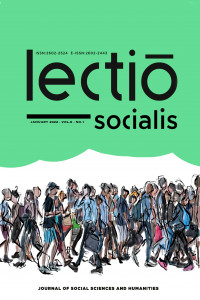Öz
It is tempting when viewing the Brexit referendum and its justifications to lean on identity based analyses for explanations, pointing to a rise in right wing nationalism. However, if we are to look at the economic standing of those who voted no in the Brexit referendum, and moreover, to realize their place in larger flows of neoliberalism, a more complex picture comes into view. Neo-Gramscian theory is uniquely placed on this backdrop in its ability to give us a critical perspective on hegemony, as well as backlash towards it. In the course of this paper, the possibility that Brexit offers us an example of anti-hegemonic backlash against the larger neoliberal project of the EU will be explored. That is to say, in the context of an organic project of neoliberal expansion in which the leftist alternative in the UK has largely come to support further integration into the EU, to what extent can the Brexit vote be seen as counter-hegemony with no outlet?
Anahtar Kelimeler
Kaynakça
- Andreouli, Eleni, and Cathy Nicholson (2018). Brexit and Everyday Politics: An Analysis of Focus Group Data on the EU Referendum. Political Psychology, 39 (6), 1323-1338.
- Bieler, Andreas (2005). Class Struggle over the EU Model of Capitalism: Neo-Gramscian Perspectives and the Analysis of European Integration. Critical review of International Social and Political Philosophy, 8 (4), 513-526.
- Bieler, Andreas, and Adam David Morton (2004). A Critical Theory Route to Hegemony, World Order and Historical Change: neo-Gramscian perspectives in International Relations. Capital and Class, 28 (1), 85-113.
- Bieling, Hans-Jürgen and Jochen Steinhilber (2000). Hegemonic Projects in the Process of European Integration. In Hans-Jürgen Bieling and Jochen Steinhilber (Eds.), Dimensions of a Critical Theory of European Integration (pp. 33-57). Forschungsgruppe Europäische Gemeinschaften.
- Gibbins, Justin (2020). Theorizing Brexit: UK/EU Relations and International Relations Theory. International Virtual Conference on Social Sciences.
- Gill, Stephen (2000). Theoretical Foundations of a Neo-Gramscian Analysis of European Integration. In Hans-Jürgen Bieling and Jochen Steinhilber (Eds.), Dimensions of a Critical Theory of European Integration (pp. 15-32). Forschungsgruppe Europäische Gemeinschaften.
- Jessop, Bob (2017). The Organic Crisis of the British State: Putting Brexit in its Place. Globalizations, 14 (1), 133-141.
- Jessop, Bob (2018). Neoliberalization, Uneven Development, and Brexit: Further Reflections on the Organic Crisis of the British State and Society. European Planning Studies, 26 (9), 1728-1746.
- Morgan, Paul (2016). BBC News Referendum the moment they knew 24/6/16 (Video file), https://www.youtube.com/watch?v=DVDH0nsJ0jA (24.06.2016).
- Robinson, William (2005). Gramsci and Globalization: From Nation-State to Transnational Hegemony. Critical Review of International Social and Political Philosophy, 8 (4), 559-574.
- Rosamond, Ben (2019). Brexit and the Politics of UK Growth Models. New Political Economy, 24 (3), 408-421.
- Salter, Brian (2018). When Intellectuals Fail? Brexit and Hegemonic Challenge. Competition & Change, 22(5), 467-487.
- Žižek, Slavoj (2016). Dear Britain. (2016, June 4). The Guardian. https://www.theguardian.com/books/2016/jun/04/dear-britain-letters-from-europe-referendum.
Öz
Kaynakça
- Andreouli, Eleni, and Cathy Nicholson (2018). Brexit and Everyday Politics: An Analysis of Focus Group Data on the EU Referendum. Political Psychology, 39 (6), 1323-1338.
- Bieler, Andreas (2005). Class Struggle over the EU Model of Capitalism: Neo-Gramscian Perspectives and the Analysis of European Integration. Critical review of International Social and Political Philosophy, 8 (4), 513-526.
- Bieler, Andreas, and Adam David Morton (2004). A Critical Theory Route to Hegemony, World Order and Historical Change: neo-Gramscian perspectives in International Relations. Capital and Class, 28 (1), 85-113.
- Bieling, Hans-Jürgen and Jochen Steinhilber (2000). Hegemonic Projects in the Process of European Integration. In Hans-Jürgen Bieling and Jochen Steinhilber (Eds.), Dimensions of a Critical Theory of European Integration (pp. 33-57). Forschungsgruppe Europäische Gemeinschaften.
- Gibbins, Justin (2020). Theorizing Brexit: UK/EU Relations and International Relations Theory. International Virtual Conference on Social Sciences.
- Gill, Stephen (2000). Theoretical Foundations of a Neo-Gramscian Analysis of European Integration. In Hans-Jürgen Bieling and Jochen Steinhilber (Eds.), Dimensions of a Critical Theory of European Integration (pp. 15-32). Forschungsgruppe Europäische Gemeinschaften.
- Jessop, Bob (2017). The Organic Crisis of the British State: Putting Brexit in its Place. Globalizations, 14 (1), 133-141.
- Jessop, Bob (2018). Neoliberalization, Uneven Development, and Brexit: Further Reflections on the Organic Crisis of the British State and Society. European Planning Studies, 26 (9), 1728-1746.
- Morgan, Paul (2016). BBC News Referendum the moment they knew 24/6/16 (Video file), https://www.youtube.com/watch?v=DVDH0nsJ0jA (24.06.2016).
- Robinson, William (2005). Gramsci and Globalization: From Nation-State to Transnational Hegemony. Critical Review of International Social and Political Philosophy, 8 (4), 559-574.
- Rosamond, Ben (2019). Brexit and the Politics of UK Growth Models. New Political Economy, 24 (3), 408-421.
- Salter, Brian (2018). When Intellectuals Fail? Brexit and Hegemonic Challenge. Competition & Change, 22(5), 467-487.
- Žižek, Slavoj (2016). Dear Britain. (2016, June 4). The Guardian. https://www.theguardian.com/books/2016/jun/04/dear-britain-letters-from-europe-referendum.
Ayrıntılar
| Birincil Dil | İngilizce |
|---|---|
| Konular | Siyaset Bilimi, Sosyoloji |
| Bölüm | Araştırma Makaleleri |
| Yazarlar | |
| Yayımlanma Tarihi | 29 Ocak 2022 |
| Gönderilme Tarihi | 15 Aralık 2021 |
| Kabul Tarihi | 7 Ocak 2022 |
| Yayımlandığı Sayı | Yıl 2022 Cilt: 6 Sayı: 1 |
Lectio Socialis is a prestigious, international, and peer-reviewed journal that aims to provide a platform for scholars and researchers to share their work and ideas on policy-relevant topics related to social sciences. The journal welcomes high-quality articles from a wide range of disciplines, including economics, political science, public administration, business administration, international relations, urban planning, sociology, psychology, history, jurisprudence, and philosophy. The primary objective of Lectio Socialis is to maintain a vibrant, independent, and unbiased environment for scholars and researchers from different parts of the world to present their research, exchange ideas, and contribute to the advancement of knowledge in their respective fields.



